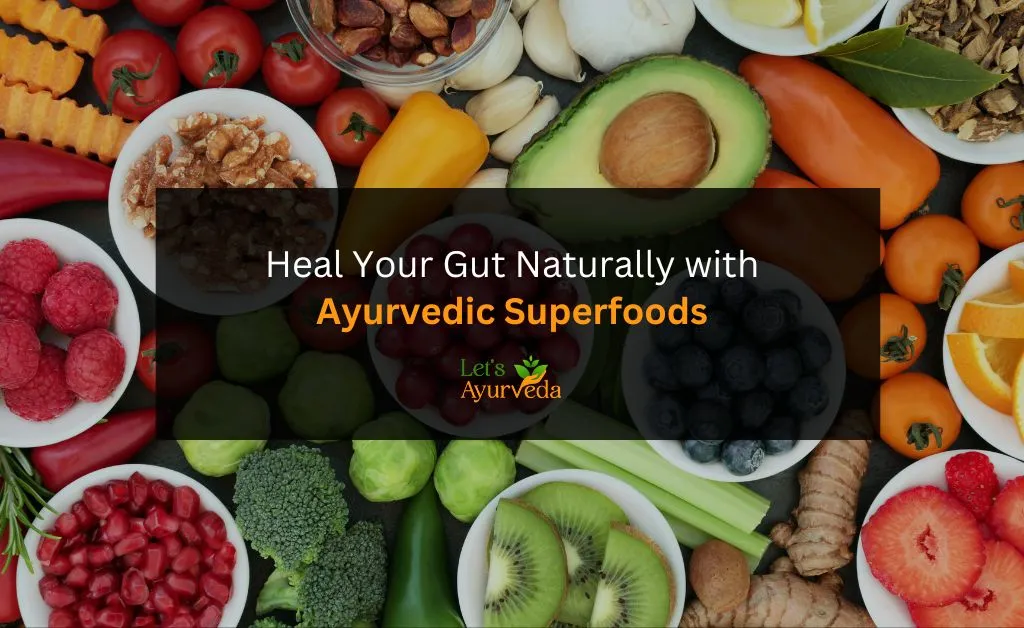When it comes to staying healthy, your gut plays a huge role. Think of your gut as the control center of your body. It helps digest food, absorb nutrients, and even keeps your immune system strong.
But how do you keep your gut happy and healthy? One way is by turning to Ayurveda, an ancient system of medicine that focuses on balance and natural healing.
In this blog, we’ll explore some amazing Ayurvedic superfoods that can boost your gut health and also talk about what foods to avoid. Let’s dive in!
What is Ayurveda?
Ayurveda is a 5,000-year-old system of natural healing that started in India. The word “Ayurveda” means “the science of life.” It teaches us how to live in harmony with nature and take care of our bodies using food, herbs, and lifestyle habits.
According to Ayurveda, a healthy gut is the key to overall wellness. When your gut is out of balance, you might feel tired, bloated, or even get sick more often. But don’t worry—Ayurveda has simple solutions to help you feel your best!
Why is Gut Health Important?
Your gut is home to trillions of bacteria, both good and bad. When the good bacteria are in charge, your digestion works smoothly, and you feel energetic. But if the bad bacteria take over, you might experience problems like stomach aches, constipation, or even skin issues. Eating the right foods can help keep your gut balanced and your body strong.
Ayurvedic Superfoods for Gut Health
Here are some Ayurvedic superfoods that are great for your gut. These foods are easy to find, delicious, and packed with nutrients that your body will love.
1. Ghee (Clarified Butter)
Ghee is a type of butter that has been cooked to remove milk solids. It’s rich in healthy fats and is known to soothe the digestive system. Ayurveda recommends adding a teaspoon of ghee to your meals to help your body absorb nutrients better. It also helps reduce inflammation in the gut.
2. Turmeric
Turmeric is a bright yellow spice that’s famous for its anti-inflammatory properties. It can help heal the lining of your gut and improve digestion. You can add a pinch of turmeric to your soups, curries, or even warm milk (known as “golden milk”).
3. Ginger
Ginger is a powerful root that can calm an upset stomach and reduce bloating. It also helps your body produce digestive enzymes, which break down food more efficiently. Try drinking ginger tea or adding fresh ginger to your meals.
4. Triphala
Triphala is an Ayurvedic herbal blend made from three fruits: amla, bibhitaki, and haritaki. It’s often used to support digestion and cleanse the gut. You can take Triphala as a powder or in capsule form, but make sure to follow the instructions on the package.
5. Yogurt (with Live Cultures)
Yogurt is packed with probiotics, which are good bacteria that keep your gut healthy. Look for yogurt that says “live and active cultures” on the label. You can enjoy it plain or add some fresh fruit for a tasty snack.
6. Cumin Seeds
Cumin seeds are tiny but mighty! They help reduce gas and bloating while improving digestion. You can roast cumin seeds and sprinkle them on your food or boil them in water to make a simple digestive tea.
7. Fennel Seeds
Fennel seeds are another great option for gut health. They can relax your digestive muscles and reduce cramps. Chew on a few fennel seeds after meals or brew them into a tea.
8. Leafy Greens
Leafy greens like spinach, kale, and cilantro are rich in fiber, which helps keep your digestive system moving. They also contain vitamins and minerals that support overall health. Try adding a handful of greens to your smoothies or salads.
What to Avoid for a Healthy Gut
Just as some foods can help your gut, others can harm it. Here are a few things to avoid if you want to keep your gut in top shape.
1. Processed Foods
Processed foods like chips, cookies, and frozen meals are often high in sugar, salt, and unhealthy fats. These ingredients can upset the balance of bacteria in your gut and lead to inflammation. Instead, choose whole, natural foods whenever possible.
2. Sugary Drinks
Sodas, energy drinks, and even some fruit juices are loaded with sugar. Too much sugar can feed the bad bacteria in your gut and cause problems like bloating and gas. Stick to water, herbal teas, or fresh fruit-infused water.
3. Fried Foods
Fried foods are hard to digest and can irritate your stomach. They also contain unhealthy fats that can harm your gut lining. Instead of frying, try baking, steaming, or grilling your food.
4. Artificial Sweeteners
Artificial sweeteners like aspartame and sucralose might seem like a healthy alternative to sugar, but they can actually disrupt your gut bacteria. If you need something sweet, try using natural options like honey or maple syrup in moderation.
5. Dairy (if You’re Sensitive)
Some people have trouble digesting dairy products like milk and cheese. If you notice that dairy makes you feel bloated or gassy, try switching to plant-based alternatives like almond milk or coconut yogurt.
Tips for a Healthy Gut
In addition to eating the right foods, here are a few simple tips to keep your gut happy:
-
Eat Mindfully: Take your time to chew your food properly. This helps your body digest food more easily.
-
Stay Hydrated: Drink plenty of water throughout the day. Water helps move food through your digestive system.
-
Get Moving: Exercise can improve digestion and reduce stress, which is good for your gut.
-
Sleep Well: Aim for 8-9 hours of sleep each night. Your gut needs rest to function properly.
Final Thoughts
Taking care of your gut doesn’t have to be complicated. By adding Ayurvedic superfoods like ghee, turmeric, and ginger to your diet, you can support your digestion and feel great. At the same time, try to avoid processed foods, sugary drinks, and fried snacks that can harm your gut. Remember, small changes can make a big difference. Start with one or two tips from this blog and see how your body responds. Your gut will thank you!
So, what are you waiting for? Give these Ayurvedic superfoods a try and take the first step toward a healthier, happier gut. You’ve got this!






